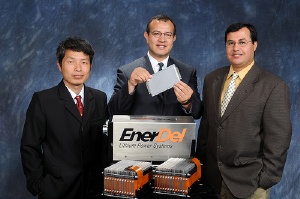May 8 2009
Three scientists at the U.S. Department of Energy's (DOE) Argonne National Laboratory have won an Excellence in Technology Transfer Award for a battery system expected to help reduce greenhouse gas emissions, as well as America's dependence of imported oil.
 Argonne researchers (left) Zonghai Chen, Khalil Amine, and Ilias Belharouak won an Excellence in Technology Transfer Award for a battery system expected to help reduce greenhouse gas emissions, as well as America's dependence of imported oil. The Federal Laboratory Consortium for Technology Transfer presented the award for a "very high power battery system" based on a nano-lithium titanate
Argonne researchers (left) Zonghai Chen, Khalil Amine, and Ilias Belharouak won an Excellence in Technology Transfer Award for a battery system expected to help reduce greenhouse gas emissions, as well as America's dependence of imported oil. The Federal Laboratory Consortium for Technology Transfer presented the award for a "very high power battery system" based on a nano-lithium titanate
The Federal Laboratory Consortium for Technology Transfer presented the award to Khalil Amine, Ilias Belharouak and Zonghai Chen for a "very high power battery system" based on a nano-lithium titanate (LTO).
"The nanophased lithium titanium oxide spinel anode system is made for use in high-power lithium-ion batteries for hybrid electric vehicles (HEV)," said Amine, the technology's principal investigator. "The technology was transferred to Indianapolis-based battery manufacturer EnerDel, Inc., which uses it with a lithium manganese oxide spinel-based cathode, and has enormous commercial potential because it enables the development of safe, and long lasting high-power batteries for HEVs."
This new Li-ion battery technology promises to meet all of the U.S. Advanced Battery Consortium requirements for HEVs. "It is unquestionably the safest, among the most reliable and lowest cost Li-ion battery on the market for HEVs," Amine said.
"When combined with a lithium manganese spinel, LTO provides the highest power ever reported in a Li-ion battery, excellent cycle-life and unmatched safety performance when compared with other Li-ion battery technologies," Amine said. "Moreover, a battery based on this system won't overheat during high-rate cycling and easily achieves 5-kilowatt cold cranking at minus-30 degrees Celsius."
Essential for the transfer of technology to EnerDel was Argonne researchers' ability to meet the company's commercialization goals within the unprecedented time span of only one year, said Jeff Chamberlain, a senior account manager in Argonne's Office of Technology Transfer. "The market realities facing EnerDel when it decided to work with Argonne were such that if it could not commercialize a Li-ion battery within two years, it might as well not bother since the market opportunities could have evaporated due to domination of the emerging marketplace by established HEV battery makers and their new Li-on battery offerings."
Argonne worked with EnerDel to develop the technology under a Work-for-Others agreement. The DOE Vehicle Technologies Program provides funding for battery research and development at Argonne.
The technology is also a 2008 R&D 100 Award winner.